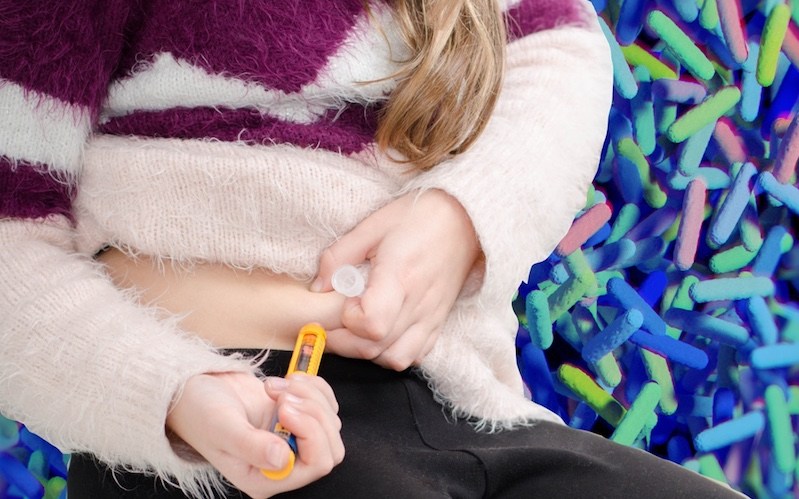Immune gene guards against type 1 diabetes by changing the microbiome. Do early antibiotics undercut its effects?

The health of our immune system is increasingly linked with the health of our intestinal bacteria. A mouse study from Harvard Medical School now hammers this home for autoimmune disorders, in which the body attacks its own cells. It looked specifically at type 1 diabetes, in which the body destroys the cells that make insulin.
Scientists have long known that the human leukocyte antigen (HLA) complex of proteins (also known as the major histocompatibility complex, or MHC) keep autoimmune responses in check. Certain common variants of the HLA/MHC genes are known to protect against a type 1 diabetes. But until now, how these genes prevent autoimmune reactions has been a mystery.
Don’t mess with my microbiome
The research team, led by Diane Mathis, BSc, PhD and Christophe Benoist, MD, PhD of HMS’s Department of Microbiology and Immunobiology, worked with mice genetically prone to diabetes. They had two key findings.
First, the gene protecting against autoimmunity exerts its effects by altering the gut microbiota. Second, this protection could be undercut three ways: by giving the mice antibiotics during the first six weeks of life, by giving their mothers antibiotics late in gestation or simply by raising the mice in a sterile, microbe-free environment. In all these experiments, the mice developed severe pancreatic inflammation, a harbinger of type 1 diabetes — even when they carried the protective gene.
The findings were reported last week in the Proceedings of the National Academy of Sciences. Michael Silverman, MD, PhD, a fellow in Infectious Diseases at Boston Children’s Hospital, now at the Children’s Hospital of Philadelphia, was first author of the paper.
While humans and mice aren’t identical, the scientists say their findings point to a time window for proper development of the gut microbiome.
“Our results powerfully illustrate the notion that early antibiotic exposure can modulate disease risk, and that avoiding or at least minimizing antibiotic treatment in infants and pregnant women during critical periods of development may be a good idea,” says Mathis.
The researchers also believe their parallel finding in mice raised in sterile cages is consistent with the “hygiene hypothesis.” That hypothesis proposes that inadequate germ exposure during early childhood may increase later risk for allergic and autoimmune disease.
Poop transplants for type 1 diabetes?
This study shouldn’t be taken as a reason to withhold antibiotics from sick newborns or deliberately expose them to germs. But it does raise the interesting question of whether changing the microbiome could alter diabetes risk. In the study, genomic and proteomic analyses revealed that diabetes-prone mice with and without the protective gene hosted distinct intestinal microbiomes early in life.
In a final set of experiments, the team performed fecal transplants. These effectively gave diabetes-prone mice the same microbiome as their counterparts with the guardian gene. That was enough to dramatically reduce pancreatic cell inflammation and avert diabetes in these “at risk” mice.
Get more details on the research from Harvard Medical School.
Related Posts :
-

New genetic insights could change how we treat, and talk about, polycystic ovary syndrome
Polycystic ovary syndrome (PCOS) has long been viewed as a hormonal disorder affecting women of reproductive age. However, ongoing research ...
-

Navigating school with a neuroimmune condition
Fifteen-year-old Sarah had been challenging her dad to card games all week — and on Saturday, she finally beat him. It ...
-

No limitations: How Flora found answers for MOG antibody disease
Flora Ringler’s fifth birthday didn’t turn out as she had hoped. She and her family were vacationing in ...
-

Partnering diet and intestinal microbes to protect against GI disease
Despite being an everyday necessity, nutrition is something of a black box. We know that many plant-based foods are good ...





